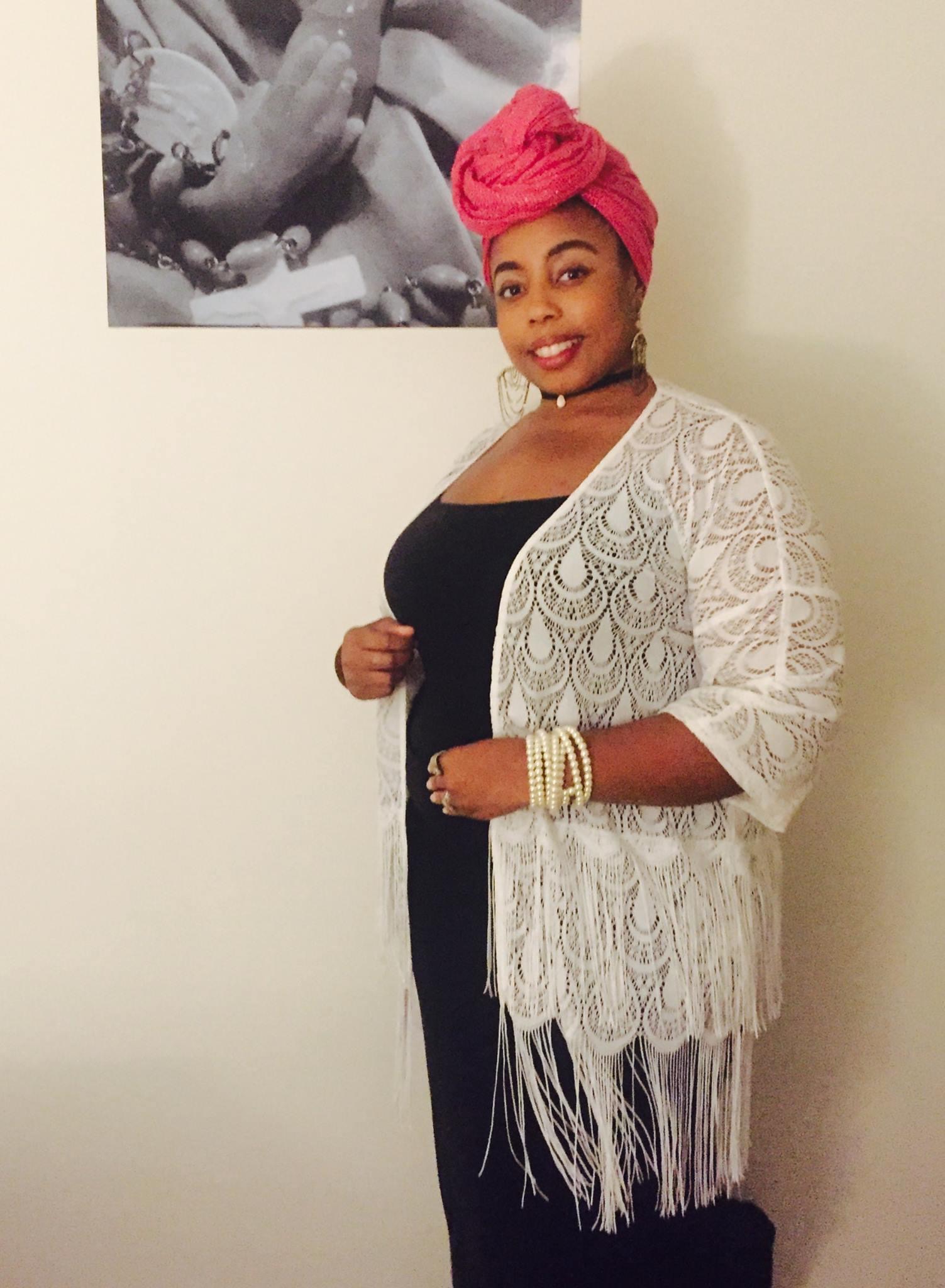RUTHIE WALKER, of Stanton Heights, stands next to her custom-made throw blanket honoring the life of her grandson, Raymond Akil Ager, who was stillborn. The “Baby Ray Fund” is now established to help Black families get mental health services following the loss of a baby to stillbirth. (Photo by Rob Taylor Jr.)
Raymond Ager was used to having a football in his hands, but nothing like this particular football.
Instead of being in a Perry High School Commodores uniform on the field, on this day, Sept. 12, 2020, he was surrounded by his wife, Tasha, and 60 other impatiently waiting family, friends and supporters, about to punt a custom-made football that would explode with either a pink or blue substance.
Some in the audience at the “Touchdowns or Tutus” gender reveal party at Monroeville Park on that Saturday, September afternoon were hoping to see pink fill the air, which would mean that Tasha, who at the time was five months pregnant, was having a girl. Others were hoping to see nothing but boy blue.
When Raymond Ager kicked that football, the football disintegrated, and blue substances filled the sky.
The rejoicing began. Everyone went crazy. Tasha and Ray were having their first child together, a boy.
Not even a month later, Tasha, Ray, and Ray’s mother, Ruthie Walker, left UPMC Magee Womens Hospital in Oakland with just the clothes on their backs. They said their final goodbyes to “Baby Ray,” Raymond Akil Ager.
“Baby Ray” was stillborn.

TASHA AND RAY AGER, in this photo during their gender reveal party in September 2020. Their son, Baby Ray, was stillborn.
A stillbirth is the death or loss of a baby before or during delivery, according to the Centers for Disease Control and Prevention. While miscarriage and stillbirth describe pregnancy loss, the CDC said that in the U.S., a miscarriage is usually defined as loss of a baby before the 20th week of pregnancy, and a stillbirth is loss of a baby at or after 20 weeks of pregnancy.
Black mothers are more than twice as likely to experience stillbirths compared to White or Hispanic mothers, according to recent CDC studies. In the results of a CDC study from 2015-2017, health problems that occurred during pregnancy or underlying health conditions were listed as the cause of the stillbirth three times more often among Black mothers than among White mothers.
Even in the United Kingdom, the data reveals the same conclusion. According to a BBC report, Black mothers there experienced stillbirths at a rate of 7.23 for every 1,000 births in 2019, while White mothers experienced it at a rate of 3.22.
In Pennsylvania, the rates for stillbirths are higher than the national average, as roughly 800 stillbirths occur yearly in the state. In Allegheny County, Black mothers experience stillbirths at a rate of 9.0 per 1,000, more than double the rate that White mothers experience it (4.4 per 1,000).
For some mothers, they internalize a stillbirth as being their fault, and go into deep mental anguish. Some never want to talk about the experience. Walker decided to honor her grandson with an event entitled, “A Ray of Hope,” which occurred on Oct. 30, exactly one year after a funeral service was held for Baby Ray. Baby Ray’s funeral was held at White Memorial Chapel, in Wilkinsburg; the “Ray of Hope” event was held at the Sto-Rox Public Library.
Walker told the New Pittsburgh Courier she felt compelled to create a fundraising event that would bring attention to Black mothers needing mental health services and support from doulas in times of crisis related to pregnancy and childbirth. She said too often, Black mothers are left without professional support during, say, a stillbirth, miscarriage or in the time period following a healthy childbirth. Doulas are professional labor assistants who provide physical and emotional support for women during pregnancy, childbirth and the postpartum period.
Walker lauded Heather Bradley, founder and executive director of the Pittsburgh Bereavement Doulas organization, for playing an “instrumental” role in helping her, her son and daughter-in-law from the day prior to delivering Baby Ray on Oct. 3, 2020, and until the day the three left Baby Ray at the hospital for good (Oct. 6, 2020).
“She (Heather) gave me a different perspective,” Walker said. “She said, granted he wasn’t going to be alive, but this is someone who, you heard his heartbeat, you felt his touch, he responded to your touch and even responded to your voices by kicking or moving.”
Prior to Bradley’s involvement, Walker said her family had no professional help on how to grieve after learning about the baby having no heartbeat on Sept. 30, 2020.

BRANDY GENTRY, founder of Oli’s Angels doula services. She experienced a stillbirth in 2010. The hands of her son, Oliver Preston, are also pictured.
Not having that professional help available was what pushed Brandy Gentry into becoming a certified doula. At age 23, the Braddock native was set to have her first child, a boy, when she, too, experienced a stillbirth. On Christmas Day of 2010, doctors shared with her that they couldn’t find a heartbeat on little Oliver Preston, and later that evening, he was stillborn.
“I didn’t have access to supportive services for myself and my family,” Gentry told the Courier. “I was left to make really hard decisions that I was completely unfamiliar with, such as did I want to hold my baby, do I want to see him…things that otherwise wouldn’t have been optional (in a traditional delivery).”
Gentry even had to decide whether to have a funeral for Oliver, which she ultimately decided in the affirmative. “But in the Black community, that was different,” she said. “I kept hearing, ‘Wow, I’ve never heard of that before,’ or, ‘We didn’t even know that was an option.’”
In 2014, Gentry earned her doula certification, and named her organization “Oli’s Angels,” after her late son, whose nickname was “Oli P.”

IYANNA BRIDGES leads The Birthing Hut. She is a certified doula.
Now, she’s one of the leading African American doulas in the region, and she partners with other doulas, such as Iyanna Bridges, another African American woman with her own organization, “The Birthing Hut.” Gentry holds the contract with the Allegheny County Jail to provide doula services there to pregnant women. Gentry or another contracted doula has provided professional services to nearly 15 women housed at the jail in the past two years.
“There should be a doula for every woman who wants one, and that should also include when women and families are experiencing pregnancy and infant loss,” Gentry, now 34, told the Courier. “I’ve been part of an effort to educate the community on the need and the benefit of doula services…we were sitting down with genetic counselors, neonatologists, OB/GYNs who were completely unfamiliar with why doula services were relevant to pregnancy and infant loss, and now that’s not the case. Everyone is pretty open to incorporating doula support.”

RUTHIE WALKER presents the Pittsburgh Bereavement Doulas, led by Heather Bradley, with a $2,500 check that will go towards the “Baby Ray Fund.” The Baby Ray Fund seeks to cover costs for Black families who have experienced a stillbirth.
The loss of Baby Ray was too much for Walker’s family to handle at the time.
“I sat in my car and cried,” Walker recalled on Oct. 6, 2020, when she left the hospital; her son, Ray, and daughter-in-law, Tasha, wiping away tears in a separate vehicle. The three close-knit family members had watched other families leave the hospital with balloons, plants and a healthy baby, while they were leaving “with grief.”
As Ruthie Walker concocted the plans for the “Ray of Hope” event, she wanted to assure that Black families could have access to mental health services in addition to doula support. Thus, Walker and Bradley established the “Baby Ray Fund” through the Pittsburgh Bereavement Doulas organization to help pay for those services in the event of a stillbirth. Through ticket sales of the hour-long “Ray of Hope” event, Walker presented Bradley’s organization with a $2,500 check to go towards the Baby Ray Fund.
“Losing a baby is a traumatic experience,” Walker told the Courier. “That life you had inside of you, you felt moving around, you could feel the formation of, say, a foot, that life that responded to your touch and your voice, is now dead. That’s traumatic. As a Black culture we don’t seek out mental health services a lot of times. It’s important to get the word out that when we have trauma, there’s help out there for it.”
(Editor’s Note: To contribute to the Baby Ray Fund, call Pittsburgh Bereavement Doulas at 412-901-9568.)

